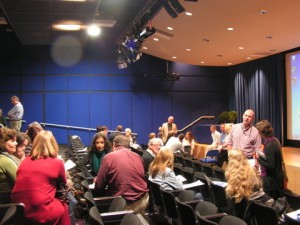One of the themes that is buzzing around in the circles in which I move is ‘programme-focused assessment’. That terminology comes from Chris Rust who gave a workshop on the PASS (Programme Assessment Strategies) Project at the OU something over a month ago. This project aimed to ‘confront a fundamental issue for every HE course/programme leader: how to design an effective, efficient, inclusive and sustainable assessment strategy which delivers the key course/programme outcomes.’
We started off by considering some of the problems/issues in current assessment practice, including the following:
- Failure to ensure the assessment of the espoused programme outcomes.
- Atomisation of assessment: focused at the micro-level on what is easy to assess; failure to integrate and assess complex, higher-order learning; the sum of parts not making the intended whole.
- Students and staff failing to see the links/coherence of the programme.
The idea is that programme-focused assessment will resolve these issues and provide us with integrative, authentic assessment. Well, maybe.
The problem is that, in our OU workshop, all we seemed able to think about was assessing students at a level above that of the individual module. Perhaps a noble aim but rather impractical, where modules are used in different ways in different programmes and some students only study at a 30-credit per year study intensity, so if you only have summative assessment every 120 credits, for these students that would mean one assessment point for everything done over a 4-year period. Memories of finals, but even worse (I did a three-year degree and had Part 1s).
 It is therefore with some relief that I discovered recently that we’re back to thinking that all assesment should take place within modules. But that doesn’t mean we should stop thinking about programme-focused assessment. Several weeks ago we had a wonderful Science Assessment Day. 70 Faculty members talking and thinking about assessment for a whole day, and working together to make things better. Magic.
It is therefore with some relief that I discovered recently that we’re back to thinking that all assesment should take place within modules. But that doesn’t mean we should stop thinking about programme-focused assessment. Several weeks ago we had a wonderful Science Assessment Day. 70 Faculty members talking and thinking about assessment for a whole day, and working together to make things better. Magic.
One of the things that we quickly realised was that we have all sorts of little inconsistencies in our practice. For example, even when modules assess against learning outcomes, they don’t always use the same language in doing so. In the light of Audrey Brown’s impressive presentation, all we could do was to pity the students. And some of the inconsistencies will be easy to fix.
On a slightly longer time-scale we will be working in pathways groups to make the assessment of our programmes more holistic. So programme-focused assessment = joined-up thinking.
There is lots of other interesting work going on in this area. I particularly like Gwyneth Hughes’ work on ipsative assessment and assessment careers. We might want to revisit the idea that feedback should support progression, both within and between modules.

Thanks for the link to this through one of the JISC12 Forums, Sally.
It’s a real challenge in the OU setting, isn’t it?
As a ‘little’ AL dealing with just one module, I often yearn for some more holistic assessment of the student’s strengths and weaknesses.
The students do get hassled and stressed when we use, as you say, different language and different practices. We can’t even agree on the cut-off time. There is this nonsense ‘grace period’ (in the OU). Why not set a REAL cut-off deadline? *sigh*
Moira
thanks so much for this Moira. I would argue that what ALs do is vitally important – not so ‘little’!!
The ‘grace’ period is stupid isn’t it. It is already causing confusion and I don’t even know why it was introduced. I’ll investigate (but I don’t have a great deal of power).
Sally